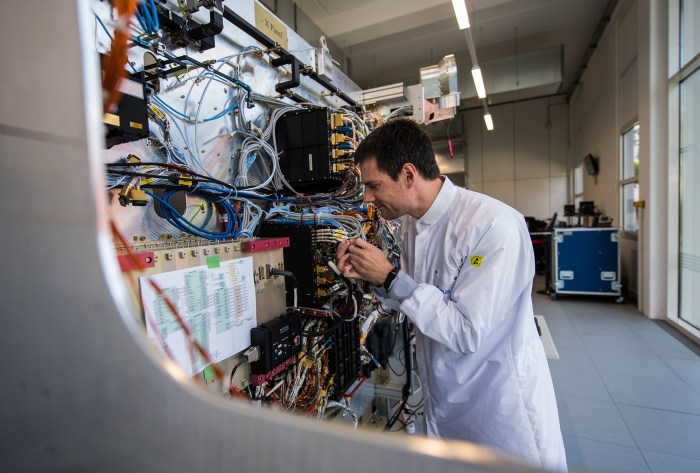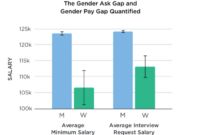Germany set to make it easier for international tech talent to get work visas – Germany is facing a serious tech talent shortage, impacting its economic growth. To address this, the country is implementing a new visa policy designed to attract skilled workers from around the world. This move aims to revitalize the German tech sector and position it as a global leader in innovation.
The new policy streamlines the visa application process for tech professionals, making it easier for them to obtain work permits. This includes simplifying the requirements, expanding the eligible visa categories, and reducing processing times. The goal is to attract a diverse pool of international talent, bringing fresh perspectives and expertise to Germany’s tech scene.
Germany’s Tech Talent Shortage

Germany, a powerhouse in engineering and manufacturing, faces a growing challenge in its quest to remain a leader in the digital age: a critical shortage of tech talent. The country’s thriving tech sector, fueled by innovation and a desire to embrace the digital revolution, is hampered by a lack of skilled workers.
This shortage has far-reaching consequences, impacting economic growth, competitiveness, and the nation’s ability to adapt to the rapidly evolving technological landscape.
The Scale of the Shortage
The tech talent shortage in Germany is a pressing issue, with a significant number of open tech positions remaining unfilled. According to a 2023 study by the German Federal Employment Agency, there were over 100,000 unfilled positions in the IT sector.
The report highlighted the difficulty in finding qualified candidates, particularly in specialized areas like software development, data science, and cybersecurity.
Reasons for the Shortage
The tech talent shortage in Germany is a complex issue with multiple contributing factors.
Demographic Trends
Germany, like many developed countries, faces a shrinking workforce due to an aging population and declining birth rates. This demographic shift puts a strain on the available talent pool, making it more difficult to find skilled workers in all sectors, including technology.
Education System
While Germany has a strong tradition of technical education, its education system is often criticized for its focus on theoretical knowledge over practical skills. This mismatch between the skills required by the tech industry and those taught in schools creates a gap that needs to be bridged.
Competition from Other Countries
Germany faces stiff competition from other countries, particularly in the United States and Asia, for top tech talent. These countries offer attractive salaries, career opportunities, and a more dynamic tech ecosystem, making them more appealing to skilled professionals.
The New Visa Policy
Germany has taken a significant step towards attracting international tech talent by introducing a new visa policy that streamlines the process and makes it easier for skilled professionals to work in the country. The new policy, which came into effect in March 2020, aims to address the country’s growing tech talent shortage and position Germany as a leading hub for innovation and technological advancement.This new policy significantly simplifies the visa process, reduces bureaucratic hurdles, and introduces new visa categories specifically tailored for tech professionals.
Key Changes in the New Visa Policy
The new visa policy introduces several key changes that aim to attract international tech talent:
- Simplified Application Process:The application process has been streamlined, making it easier and faster for tech professionals to apply for a visa. The online application platform allows applicants to submit their documents electronically, reducing the need for physical paperwork and in-person visits.
- Faster Processing Times:The processing time for visa applications has been reduced significantly. The goal is to process applications within a few weeks, allowing tech professionals to start working in Germany quickly.
- Relaxed Eligibility Criteria:The eligibility criteria for tech visas have been relaxed, making it easier for professionals with relevant skills and experience to qualify. The focus is now on the applicant’s skills and qualifications rather than on specific requirements like language proficiency or work experience in Germany.
- New Visa Categories:The new policy introduces new visa categories specifically designed for tech professionals, such as the “Highly Skilled Migrant” visa and the “Start-up” visa. These categories provide tailored pathways for different types of tech professionals, including experienced professionals, entrepreneurs, and researchers.
Comparison with Previous Regulations
The new visa policy represents a significant departure from the previous regulations, which were often considered complex and time-consuming. The previous regulations required applicants to have a specific job offer, meet strict language proficiency requirements, and undergo a lengthy and bureaucratic application process.
Check startups need pan european nasdaq compete silicon valley big tech to inspect complete evaluations and testimonials from users.
The new policy aims to address these issues by:
- Eliminating the Job Offer Requirement:The new policy allows tech professionals to apply for a visa even without a specific job offer. They can instead demonstrate their skills and qualifications and apply for a “Highly Skilled Migrant” visa. This allows professionals to explore job opportunities in Germany without having to secure a job offer upfront.
- Relaxing Language Proficiency Requirements:The new policy relaxes the language proficiency requirements, allowing applicants to apply for a visa even if they do not speak German fluently. The focus is on the applicant’s skills and qualifications, and they can demonstrate their language proficiency later once they are in Germany.
- Streamlining the Application Process:The new policy streamlines the application process by introducing an online platform for submitting documents and reducing the need for physical paperwork. This makes the process more efficient and user-friendly.
Visa Categories and Eligibility Criteria
The new visa policy introduces several visa categories specifically designed for tech professionals. Here are some of the key categories and their eligibility criteria:
Highly Skilled Migrant Visa
This visa category is designed for highly skilled professionals who have a recognized degree or professional qualification and at least five years of relevant work experience. The applicant must also demonstrate their skills and qualifications and have a job offer or a concrete plan to find employment in Germany.
Start-up Visa
This visa category is designed for entrepreneurs who want to start a business in Germany. The applicant must have a viable business idea, a business plan, and sufficient funding to establish their company. They must also demonstrate their entrepreneurial experience and commitment to their business.
Researcher Visa
This visa category is designed for researchers who want to conduct research in Germany. The applicant must have a PhD or equivalent qualification and a research project approved by a German research institution. They must also demonstrate their research experience and expertise in their field.
EU Blue Card
The EU Blue Card is a work permit that allows highly skilled professionals from outside the EU to work in any EU member state. The applicant must have a job offer in Germany and meet specific salary and qualification requirements.
Impact on Tech Industry

The new visa policy for tech talent is a game-changer for the German tech industry. It promises to attract a much-needed influx of skilled professionals, injecting new energy and innovation into the sector. This influx of talent could be the key to unlocking the full potential of Germany’s tech scene.
Boosting Innovation and Competitiveness
The new visa policy will significantly impact Germany’s tech industry by fostering innovation and boosting competitiveness. By attracting international talent, German companies will gain access to a diverse pool of expertise, leading to a more vibrant and dynamic tech landscape.
This influx of new ideas and perspectives will fuel innovation and help German companies stay ahead of the curve in a rapidly evolving global tech market.
“This policy is a significant step towards making Germany a global tech hub. It will attract the best and brightest minds from around the world, fostering innovation and driving economic growth.” Dr. [Name], CEO of [Tech Company]
Benefits for Tech Companies, Germany set to make it easier for international tech talent to get work visas
The new visa policy offers several benefits for tech companies in Germany.
- Access to a wider talent pool:The policy opens up access to a wider pool of skilled professionals, allowing companies to fill critical roles that have been difficult to fill with local talent.
- Enhanced innovation:The influx of diverse perspectives and skills will fuel innovation and drive the development of new products and services.
- Improved competitiveness:By attracting top talent, German companies can become more competitive on the global stage.
- Reduced hiring costs:The policy streamlines the hiring process for international talent, reducing administrative burdens and associated costs.
Industry Perspectives
Tech companies and industry leaders are enthusiastic about the potential impact of the new visa policy. They believe it will create a more attractive environment for tech talent, making Germany a more competitive destination for startups and established companies alike.
“This policy is a major win for Germany’s tech industry. It sends a clear signal that we are open to international talent and committed to building a thriving tech ecosystem.”
[Name], Founder and CEO of [Tech Startup]
Challenges and Considerations: Germany Set To Make It Easier For International Tech Talent To Get Work Visas

While Germany’s new visa policy for tech talent is a positive step, it’s important to acknowledge the challenges and considerations associated with attracting and integrating international tech workers. Successfully navigating these challenges will be crucial for Germany to maximize the benefits of its new policy and avoid potential pitfalls.
Language Barriers
Language proficiency is a significant barrier for international tech workers. While many tech professionals may be proficient in English, German is the official language in Germany. This can pose challenges in everyday life, communication at work, and integration into the local community.
- Communication in the workplace:Clear and effective communication is essential for collaboration, problem-solving, and professional development. Language barriers can hinder these processes, leading to misunderstandings, reduced productivity, and potential conflicts.
- Social integration:Language proficiency is crucial for building relationships, navigating social situations, and feeling comfortable in a new environment. Limited German skills can make it difficult for international workers to integrate into the local community and build a sense of belonging.
- Access to services and information:Understanding the local language is necessary for accessing essential services, navigating bureaucratic processes, and staying informed about local news and events. Language barriers can create frustration and limit opportunities for full participation in German society.
Cultural Differences
Cultural differences can also present challenges for international tech workers. These differences can range from communication styles and work ethics to social norms and expectations.
- Communication styles:Different cultures have different communication styles, which can lead to misunderstandings and misinterpretations. For example, direct communication styles may be perceived as aggressive in some cultures, while indirect communication styles may be seen as evasive in others.
- Work ethics and expectations:Work ethics and expectations can vary significantly across cultures. International tech workers may need to adjust to German work practices, which often emphasize punctuality, efficiency, and a strong work-life balance.
- Social norms and expectations:Social norms and expectations can also differ across cultures, affecting everything from personal interactions and social etiquette to dress codes and leisure activities. International tech workers may need to learn and adapt to these differences to navigate social situations effectively.
Impact on Local Job Markets
While the new visa policy aims to address Germany’s tech talent shortage, concerns exist about its potential impact on local job markets. Some argue that the influx of international tech workers could displace German workers and create competition for jobs.
- Potential for displacement:The influx of international tech workers could increase competition for jobs, potentially displacing some German workers. This concern is particularly relevant in areas where the tech talent pool is already limited, such as smaller cities or specialized roles.
- Importance of upskilling and reskilling:To mitigate potential displacement, it’s crucial to focus on upskilling and reskilling initiatives for German workers. This will ensure that they have the necessary skills to compete in the evolving tech landscape and take advantage of emerging opportunities.
- Creating a win-win situation:The new visa policy can create a win-win situation by attracting international talent while simultaneously investing in the skills development of German workers. This approach can foster a more diverse and competitive tech sector, benefiting both domestic and international talent.
Pros and Cons of the New Visa Policy
Here is a table comparing the pros and cons of the new visa policy:





